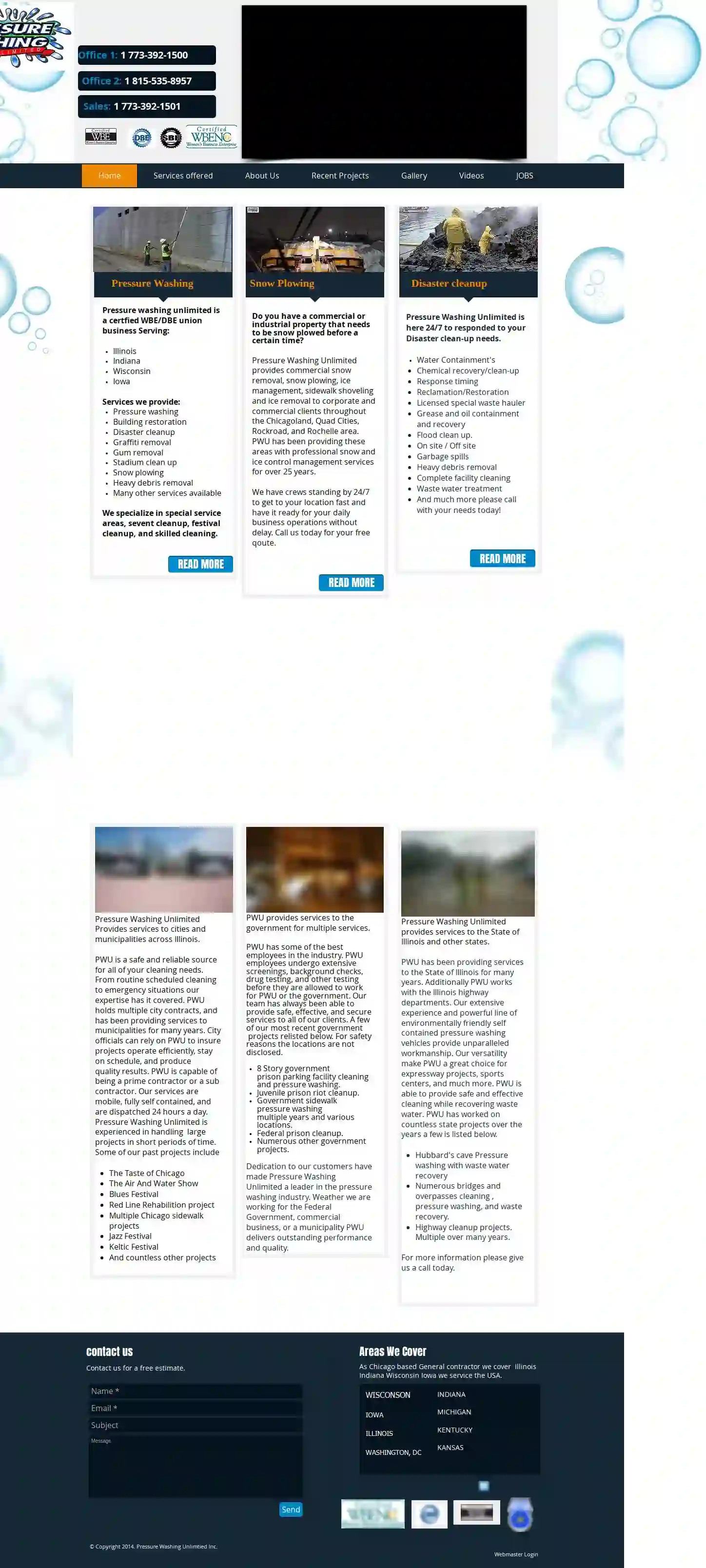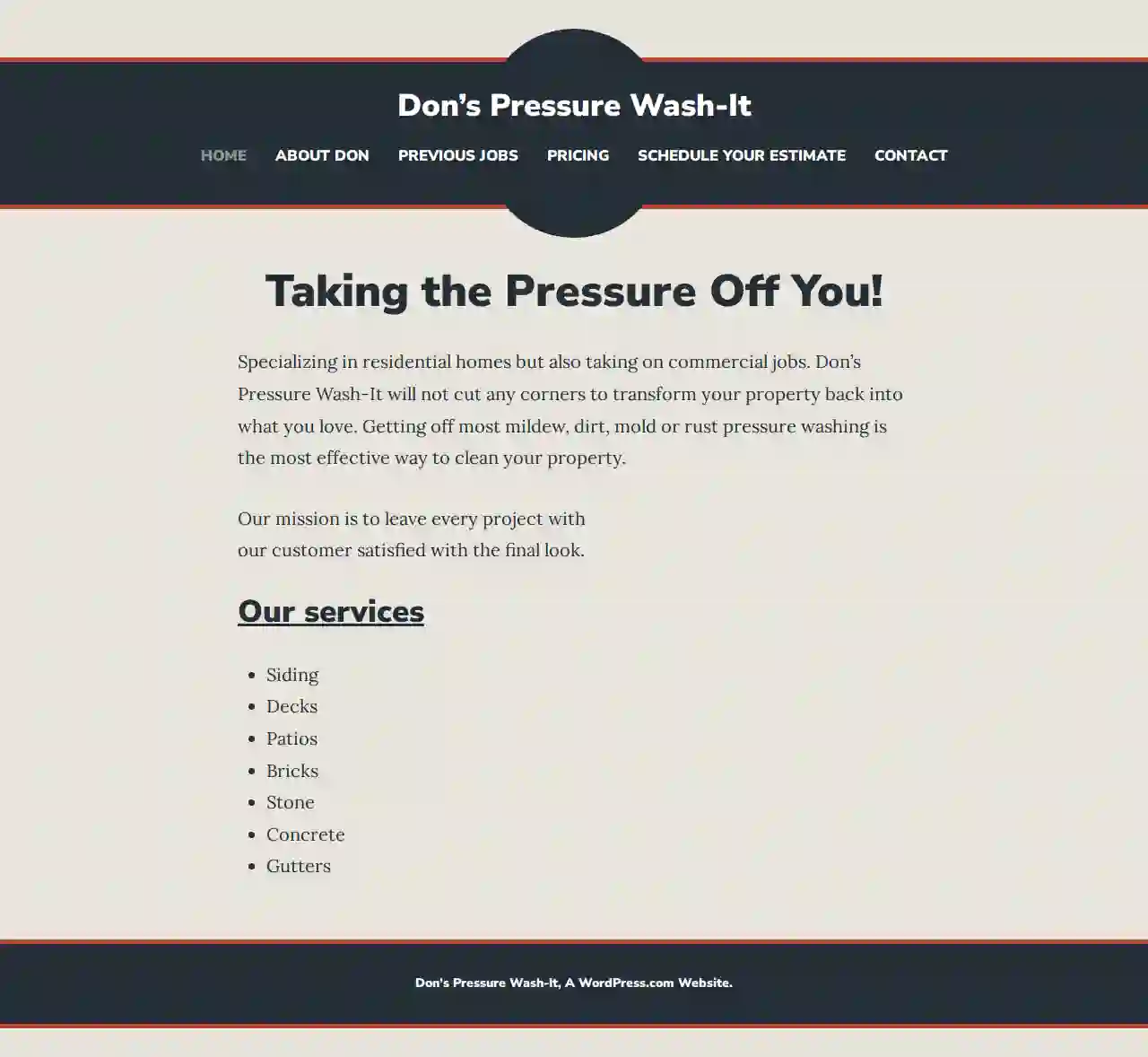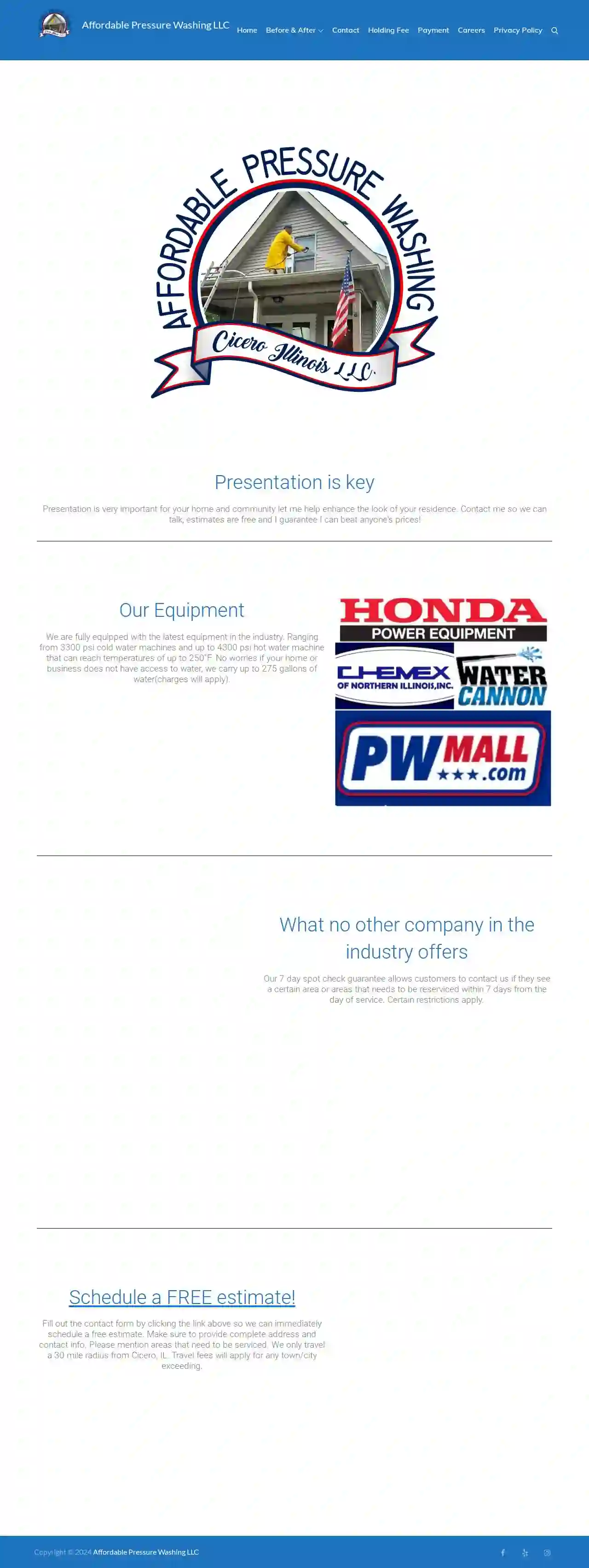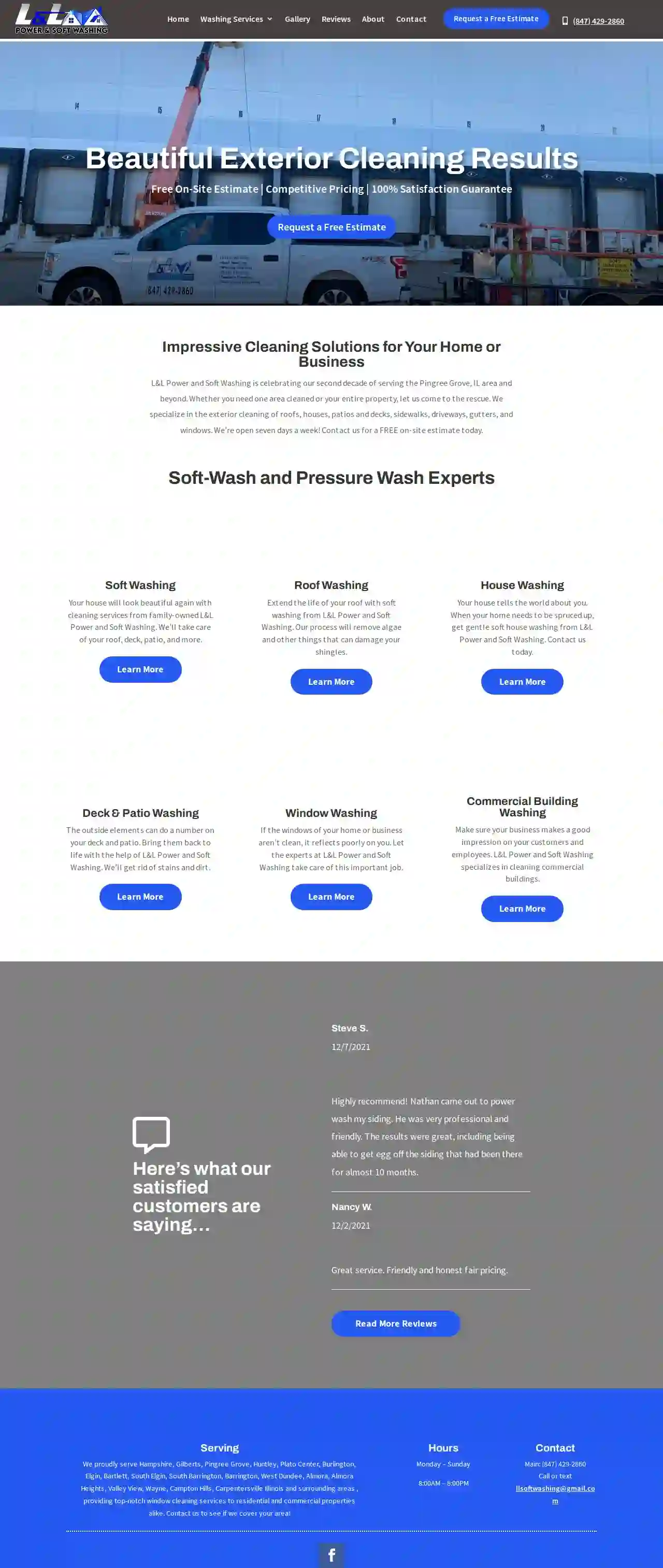Pressure Washing University Park
Top 10 Exterior Cleaning in University Park
Get 3 FREE Power Washing quotes for your project today! Compare profiles, reviews, accreditations, portfolio, etc... and choose the best offer.

Pressure Washing Unlimited/ PWU
52 reviewsSuite 100, Chicago, IL, 123 Main St, 60601, USPressure Washing Unlimited is a certified WBE/DBE union business that specializes in providing a variety of services including pressure washing, building restoration, disaster cleanup, graffiti removal, gum removal, stadium cleanup, snow plowing, and heavy debris removal. They serve Illinois, Indiana, Wisconsin, and Iowa.
- Services
- Why Us?
- Accreditations
- Our Team
- Testimonials
- Gallery
Get Quote
All Purpose Power & Softwash
56 reviews349 Grapevine Trl, Oswego, 60543, USAll Purpose Power & Softwash is your local, hometown pressure washing expert serving Aurora and the surrounding areas. We are a professional pressure washing company dedicated to providing affordable curb appeal for all residential, commercial, and local business owners. We take pride in our work and are committed to customer satisfaction, offering a 100% customer satisfaction guarantee. Our team has a combined three years of experience and offers a wide variety of services, including house washing, roof cleaning, driveway washing, patio washing, commercial pressure washing, and more! We use the latest techniques and equipment to ensure the best possible results without damaging your property. When you choose All Purpose Power & Softwash, you can expect: Exceptional customer service Superior workmanship Top-quality results Affordable pricing A 100% customer satisfaction guarantee Contact us today for a free estimate and let us help you achieve the clean and fresh look you deserve!
- Services
- Why Us?
- Our Team
- Testimonials
- Gallery
Get Quote
National SoftWash, Inc
4.9361 reviews123 Main St, Plainfield, 60563, USNational SoftWash is a leading provider of exterior cleaning services, including house washing, siding cleaning, roof cleaning, brick cleaning, gutter cleaning, fence & deck washing, and concrete & paver cleaning. They offer both soft washing and power washing services, catering to residential and commercial clients. Their team is dedicated to providing top-quality services, ensuring customer satisfaction and maintaining a strong reputation in the industry.
- Services
- Why Us?
- Accreditations
- Our Team
- Testimonials
- Gallery
Get Quote
Don's Pressure Wash It
5119 reviewsChicago, USTaking the Pressure Off You! Specializing in residential homes but also taking on commercial jobs. Don’s Pressure Wash-It will not cut any corners to transform your property back into what you love. Getting off most mildew, dirt, mold or rust pressure washing is the most effective way to clean your property. Our mission is to leave every project with our customer satisfied with the final look.
- Services
- Why Us?
- Gallery
Get Quote
Alpha Pressure Wash
4.914 reviews123 Main St, Rochelle, IL, 61068, USAlpha Pressure Wash is a reliable pressure washing company in Rochelle, IL and nearby areas. We provide professional services to residential and commercial customers. Our experienced team uses the latest tools and techniques to ensure thorough cleaning of your exterior surfaces. We take pride in our work and guarantee quality results at competitive prices.
- Services
- Why Us?
- Accreditations
- Our Team
- Testimonials
- Gallery
Get Quote
AMD POWER WASHING
555 reviews27992 W IL 120, 20, Lakemoor, 60051, USAmd Power Washing is a professional contractor offering exterior cleaning and pressure washing services to help remove years of grit, grime, and grease quickly, affordably, and safely. We are dedicated to helping our clients with all sizes of exterior cleaning projects and a variety of pressure washing services. Our team is supplied with the skills and equipment to complete your cleaning projects safely, efficiently, on-time, and on-budget. We are proud to bring our industry experience to each and every job we do. Whether you're looking to clean up the boat or RV, finish a minor clean-up job to restore curb appeal, or prepping for a major project, our knowledgeable team has the skills and tools to make sure the job is done right. Our team is large enough to deliver professional exterior cleaning solutions while offering the personal touches that ensure we meet your goals and exceed your expectations.
- Services
- Why Us?
- Accreditations
- Our Team
- Testimonials
- Gallery
Get Quote
Central Illinois Window Cleaning
594 reviewsBloomington, USCentral Illinois Window Cleaning is your trusted source for exceptional window cleaning and house washing services in Bloomington, IL. We are dedicated to providing outstanding customer experiences and guaranteeing your satisfaction. Our team of well-trained professionals has the experience and expertise to deliver thorough and efficient cleaning, ensuring your windows shine brightly. We understand that proper window cleaning goes beyond just surface-level cleaning. Our professionals utilize proven techniques and high-quality products to achieve optimal results while prioritizing safety. Why choose Central Illinois Window Cleaning? * **Guaranteed Satisfaction:** We stand behind our work and promise to make things right if you're not completely happy with our service. * **Experienced Professionals:** Our team is highly trained and experienced in all aspects of window cleaning and house washing. * **Efficient and Thorough:** We work efficiently to deliver a thorough clean that meets your expectations. * **Safety First:** We prioritize safety in all our operations, ensuring a secure environment for your property and our team. Contact us today for a free estimate and let us take care of your window cleaning and house washing needs!
- Services
- Why Us?
- Gallery
Get Quote
Affordable Pressure Washing Cicero Il. LLC.
597 reviewsCicero, 60804, USPresentation is keyPresentation is very important for your home and community let me help enhance the look of your residence. Contact me so we can talk, estimates are free and I guarantee I can beat anyone's prices! Our Equipment We are fully equipped with the latest equipment in the industry. Ranging from 3300 psi cold water machines and up to 4300 psi hot water machine that can reach temperatures of up to 250˚F. No worries if your home or business does not have access to water, we carry up to 275 gallons of water(charges will apply). What no other company in the industry offers Our 7 day spot check guarantee allows customers to contact us if they see a certain area or areas that needs to be reserviced within 7 days from the day of service. Certain restrictions apply. Schedule a FREE estimate! Fill out the contact form by clicking the link above so we can immediately schedule a free estimate. Make sure to provide complete address and contact info. Please mention areas that need to be serviced. We only travel a 30 mile radius from Cicero, IL. Travel fees will apply for any town/city exceeding.
- Services
- Why Us?
- Gallery
Get Quote
L&L Power and Soft Washing
546 reviewsPingree Grove, USL&L Power and Soft Washing is celebrating our second decade of serving the Pingree Grove, IL area and beyond. Whether you need one area cleaned or your entire property, let us come to the rescue. We specialize in the exterior cleaning of roofs, houses, patios and decks, sidewalks, driveways, gutters, and windows. We’re open seven days a week! Contact us for a FREE on-site estimate today.
- Services
- Why Us?
- Testimonials
- Gallery
Get Quote
Quality Pressure Washing
4.4120 reviews12530 S. Springfield Avenue, Alsip, 60803, USWe are dedicated to providing highly rated customer satisfaction to clients who seek a reliable, efficient, and consistent quality pressure washing company. Our commitment to delivering on that promise is our top priority.Since 2006, Quality Pressure Washing has been delivering on that mission with safe, high-quality pressure washing solutions to businesses, commercial properties, industrial properties, public spaces, and mobile fleets all across the Chicagoland Area.Quality Pressure Washing is experienced in working with clients of all types, including small business owners, large corporations, school systems, universities, hospitals, festivals, chambers of commerce, and various government entities.With our industry-leading equipment, cleaning techniques, and professional technicians, you are sure to get the highest quality of service for all your pressure washing needs.
- Services
- Why Us?
- Gallery
Get Quote
Over 60,241+ Janitorial Services on our directory
Our janitorial services operate in University Park and surroundings!
CleaningMatch has curated and vetted Top Cleaning Services in University Park. Find the most trustworthy business today.
Frequently Asked Questions About Pressure Washing
- Hard Surfaces: Pressure washing is often successful in removing graffiti from hard surfaces like brick, concrete, or metal.
- Delicate Surfaces: For delicate surfaces like wood or painted surfaces, a gentler approach using specialized graffiti removal products and techniques may be necessary.
- Professional Graffiti Removal: For stubborn or extensive graffiti, consider hiring a professional graffiti removal service. They have specialized equipment, cleaning solutions, and experience in dealing with various types of graffiti.
- Electric Pressure Washers: Suitable for light-duty cleaning tasks like washing cars, patios, or fences. They are less powerful than gas pressure washers but are generally more affordable and easier to operate.
- Gas Pressure Washers: More powerful than electric pressure washers, making them suitable for heavier cleaning tasks like removing stubborn stains, cleaning driveways, or stripping paint.
- PSI and GPM: Consider the PSI (Pounds per Square Inch) and GPM (Gallons per Minute) ratings. Higher PSI and GPM indicate a more powerful pressure washer. For most home cleaning tasks, a pressure washer with a PSI of 2000-3000 and a GPM of 2-3 is sufficient.
- 0-degree Nozzle: Produces a highly concentrated, powerful jet of water for removing stubborn stains or stripping paint. Use with caution as it can damage surfaces easily.
- 15-degree Nozzle: A versatile nozzle for cleaning concrete, brick, and other hard surfaces. Provides a good balance of pressure and coverage.
- 25-degree Nozzle: A wider spray pattern for cleaning delicate surfaces like siding or fences.
- 40-degree Nozzle: A very wide spray pattern, ideal for rinsing or applying cleaning solutions.
- Soap Nozzle: A low-pressure nozzle designed specifically for applying cleaning solutions.
- Rotary Nozzle: Also known as a turbo nozzle, it produces a rotating, high-impact spray for tackling tough stains and grime.
- Size of the Area: Larger areas generally cost more to pressure wash than smaller ones.
- Type of Surface: Different surfaces require different pressure levels and cleaning solutions, which can affect pricing.
- Condition of the Surface: Heavily soiled or stained surfaces may require more time and effort to clean, impacting cost.
- Accessibility: Difficult-to-reach areas may require specialized equipment and increase costs.
- Additional Services: Services like pre-treating stains, applying protective coatings, or mold removal may incur additional charges.
Can pressure washing remove graffiti?
If you're attempting DIY graffiti removal, always test the cleaning solution and pressure washing technique on an inconspicuous area first to avoid damaging the surface.
What type of pressure washer do I need for my home?
If you're unsure about the type of pressure washer best suited for your needs, consult with a pressure washing professional or a home improvement specialist.
What are the different types of pressure washer nozzles?
Choose the appropriate nozzle based on the cleaning task and the type of surface being cleaned. Consult the pressure washer manual or a professional pressure washer for guidance.
How much does pressure washing cost?
To get accurate pricing, request quotes from multiple pressure washing companies. Provide details about the size and type of surface, its condition, and any additional services you require.
Can pressure washing remove graffiti?
- Hard Surfaces: Pressure washing is often successful in removing graffiti from hard surfaces like brick, concrete, or metal.
- Delicate Surfaces: For delicate surfaces like wood or painted surfaces, a gentler approach using specialized graffiti removal products and techniques may be necessary.
- Professional Graffiti Removal: For stubborn or extensive graffiti, consider hiring a professional graffiti removal service. They have specialized equipment, cleaning solutions, and experience in dealing with various types of graffiti.
If you're attempting DIY graffiti removal, always test the cleaning solution and pressure washing technique on an inconspicuous area first to avoid damaging the surface.
What type of pressure washer do I need for my home?
- Electric Pressure Washers: Suitable for light-duty cleaning tasks like washing cars, patios, or fences. They are less powerful than gas pressure washers but are generally more affordable and easier to operate.
- Gas Pressure Washers: More powerful than electric pressure washers, making them suitable for heavier cleaning tasks like removing stubborn stains, cleaning driveways, or stripping paint.
- PSI and GPM: Consider the PSI (Pounds per Square Inch) and GPM (Gallons per Minute) ratings. Higher PSI and GPM indicate a more powerful pressure washer. For most home cleaning tasks, a pressure washer with a PSI of 2000-3000 and a GPM of 2-3 is sufficient.
If you're unsure about the type of pressure washer best suited for your needs, consult with a pressure washing professional or a home improvement specialist.
What are the different types of pressure washer nozzles?
- 0-degree Nozzle: Produces a highly concentrated, powerful jet of water for removing stubborn stains or stripping paint. Use with caution as it can damage surfaces easily.
- 15-degree Nozzle: A versatile nozzle for cleaning concrete, brick, and other hard surfaces. Provides a good balance of pressure and coverage.
- 25-degree Nozzle: A wider spray pattern for cleaning delicate surfaces like siding or fences.
- 40-degree Nozzle: A very wide spray pattern, ideal for rinsing or applying cleaning solutions.
- Soap Nozzle: A low-pressure nozzle designed specifically for applying cleaning solutions.
- Rotary Nozzle: Also known as a turbo nozzle, it produces a rotating, high-impact spray for tackling tough stains and grime.
Choose the appropriate nozzle based on the cleaning task and the type of surface being cleaned. Consult the pressure washer manual or a professional pressure washer for guidance.
How much does pressure washing cost?
- Size of the Area: Larger areas generally cost more to pressure wash than smaller ones.
- Type of Surface: Different surfaces require different pressure levels and cleaning solutions, which can affect pricing.
- Condition of the Surface: Heavily soiled or stained surfaces may require more time and effort to clean, impacting cost.
- Accessibility: Difficult-to-reach areas may require specialized equipment and increase costs.
- Additional Services: Services like pre-treating stains, applying protective coatings, or mold removal may incur additional charges.
To get accurate pricing, request quotes from multiple pressure washing companies. Provide details about the size and type of surface, its condition, and any additional services you require.